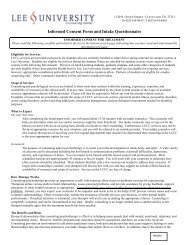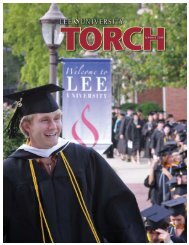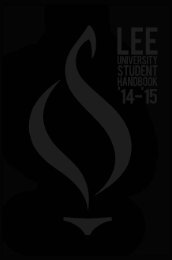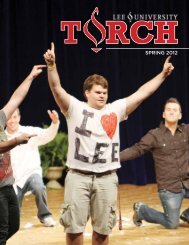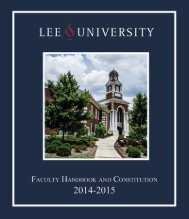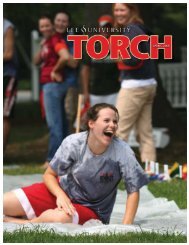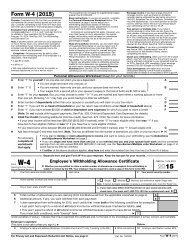Undergraduate - Lee University
Undergraduate - Lee University
Undergraduate - Lee University
You also want an ePaper? Increase the reach of your titles
YUMPU automatically turns print PDFs into web optimized ePapers that Google loves.
200 COLLEGE OF ARTS AND SCIENCES<br />
MAT 451. LINEAR ALGEBRA<br />
Three hours credit<br />
Applications of elementary linear algebra to real world problems including Leontief<br />
Economic Models, Markov Chains, theory of games, convex sets and linear inequalities, corner-point<br />
method and linear programming, the simplex method, matrix applications in genetics<br />
applications in population control, constructing of curves as surfaces, equilibrium of rigid<br />
bodies, and computer graphics. Prerequisite: MAT 351. Offered Spring Semester, odd years.<br />
MAT 461. INTRODUCTION TO MODERN ALGEBRA<br />
Three hours credit<br />
An introduction to the basic concepts of abstract algebra, including the topics of mapping,<br />
relations, number systems, groups, rings, fields, and integral domains. Prerequisite:<br />
MAT 310 or MAT 351; one year of university mathematics above 200-level. Offered Fall<br />
Semester, even years.<br />
MAT 490. MATHEMATICS SEMINAR<br />
One hour credit<br />
A weekly presentation by staff and/or senior science and mathematics majors on matters<br />
of current interest in the science and mathematics field. Participants gain experience in evaluating<br />
scientific literature and presenting scientific papers. One hour per week. One semester<br />
required of all department majors. Offered every semester.<br />
Physical Science<br />
PHS 111. PHYSICAL SCIENCE<br />
Four hours credit<br />
Chemical phenomena, introduction to methods of elementary chemistry and physics,<br />
with stress on kinetic theory, molecular phenomena,and energy relations. (Not recommended<br />
for students who studied high school chemistry and physics.) 150 minutes lecture and 110<br />
minutes lab per week. Offered Fall Semester.<br />
PHS 112. EARTH AND SPACE SCIENCE<br />
Four hours credit<br />
Introduction to astronomy, geology, meteorology, and physical geography. Emphasis on<br />
the structure of the universe, theories of cosmology, the Milky Way, and the solar system.<br />
The shape, structure, and composition of the earth; earthquakes, vulcanism, theories of plate<br />
tectonics, seafloor spreading, and continental drift. The earth in space and time; composition<br />
and structure of the earth’s atmosphere; weathering erosion, sculpturing the land, topographic<br />
maps, oceanography, and glaciation. Fossil fuels and alternate sources of energy, environmental<br />
pollution, and conservation of natural resources. 150 minutes lecture and 110 minutes<br />
lab per week. Offered every semester.<br />
Physics<br />
PHY 211. GENERAL PHYSICS (TRIG BASED)<br />
Four hours credit<br />
Principles and applications of mechanics, heat, and sound. 150 minutes lecture and<br />
110 minutes lab per week. Prerequisite: Proficiency in algebra and trigonometry. Offered<br />
Fall Semester.<br />
PHY 212. GENERAL PHYSICS (TRIG BASED)<br />
Four hours credit<br />
Principles and applications of light, electricity, magnetism, atomic and nuclear<br />
physics. 150 minutes lecture and 110 minutes lab per week. Prerequisite: PHY 211.<br />
Offered Spring Semester.<br />
PHY 281. PHYSICS (CALC BASED)<br />
Four hours credit<br />
A study of fundamental calculus-based classical physics which addresses vectors, forces,<br />
energy, conservation laws, linear and angular momentum, oscillatins and waves, electric<br />
charge and fields, and introductory circuits. 150 minutes lecture and 110 minutes lab per<br />
week. Prerequisite: MAT 271, 272 or permission of instructor. Offered Fall Semester.<br />
PHY 282. PHYSICS (CALC BASED)<br />
Four hours credit<br />
A study of Maxwell’s equations, special and general relativity, and major experimental<br />
results including the photoelectrics effect, Compton scattering, muon decay, and waveparticle<br />
duality. The main contributions of atomic and nuclear physics together with quarks, leptons,<br />
the Standard Model, and recent astrophysical discoveries will be treated. 150 minutes<br />
lecture and 110 minutes lab per week. Prerequisites: MAT 271-272 and Physics 281, or permission<br />
of instructor. Offered Spring Semester.



